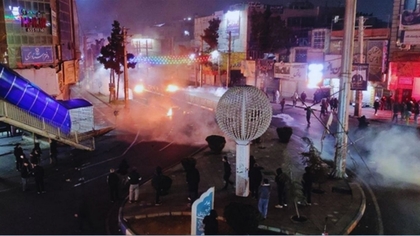Arab League Sanctions Could Hurt Syria's Regional Standing, Economic Agenda
13:11 - 29 November 2011

The Arab League\'s overwhelming approval of sanctions against Syria has dealt a significant blow to the regional standing of the government of President Bashar al-Assad. Sunday\'s vote in Cairo marks the first time in the league\'s 66-year history that it has imposed punitive economic and political sanctions on any of its 22 members.
Salman Shaikh, director of the Brookings Doha Center, says the move also is unprecedented because of Syria\'s status within the regional bloc. \"This is one of the six founding members of the Arab League, and a Syria which has always championed Pan-Arabism,\" he says. \"So to exclude Syria in effect from the Arab nation through this way I think will have probably the biggest effect on the situation.\"
Nineteen of the Arab League\'s members approved measures, including stopping transactions with the Syrian central bank, cutting off Arab government investment in Syrian projects, and imposing travel bans and asset freezes on Mr. Assad and his aides. The sanctions are designed to pressure Damascus into implementing an Arab League plan to end the government\'s deadly eight-month crackdown on dissent and allow observers to monitor its compliance.
Shaikh says the league\'s suspension of dealings with the Syrian central bank will be the most effective measure. \"This will cut the money lifeline that Syrian businesses have to trade with the Arab world in particular. We have to remember that half of Syrian trade is with the Arab world, and a quarter of all of Syria\'s imports come from the region,\" he says.
Stopping Arab direct investment also is likely to hurt the Syrian government, according to the Brookings analyst. He says Mr. Assad has relied on the United Arab Emirates and Qatar to pay for projects that have helped him to liberalize Syria\'s largely-state run economy. \"If there is now a blanket ban on those investments, I don\'t think Mr. Assad can point to any kind of reform, not even on the economic side. Businesses are lying idle, and contracts have dried up.\"
Shaikh says the impact of the travel bans and asset freezes on Syrian leaders is primarily as a message to other government officials and pro-Assad business figures that they may be next.
Arab League officials say they want to avoid causing any suffering to the wider Syrian population. In Sunday\'s vote, the league agreed not to penalize remittances sent by Syrian expatriates to their families. Hundreds of thousands Syrians work in Gulf nations.
Nadim Shehadi, an associate fellow at Chatham House in London, says the most important effect of the sanctions may be the erosion of the Assad government\'s legitimacy in the eyes of some parts of the population that have been hesitant to join the opposition uprising.
He says the merchants of Damascus and Aleppo have been waiting for a clearer response to the uprising from the international community. Until Sunday, the only major sanctions facing Syria included U.S. and European Union bans on Syrian exports of oil and other products.
But, Shehadi says the impact of all sanctions on Syria is undermined by the lack of a clear international position on Mr. Assad\'s fate.
\"The United States and Europe have expressed a lot of concern about what happens after Mr. Assad leaves, including the risk of all-out civil war,\" he says. \"This gives Mr. Assad the impression that major powers think he is indispensable and would really like him to stay and reform.\"
Shehadi says the lack of a U.N. Security Council resolution condemning the Syrian government\'s crackdown gives Mr. Assad another cushion. Russia and China vetoed such a resolution last month, fearing that it could encourage Western powers to stage the same kind of military intervention in Syria that they launched in Libya this year on the basis of an earlier resolution.
The Chatham House expert says another factor that may undermine the sanctions is that Arab League decisions are non-binding on its members. Lebanon joined Syria in rejecting the measures, and Iraq abstained.
Shaikh of Brookings says Lebanon opposes the sanctions because its dominant political force, the Hezbollah militant group, is part of an alliance with the Assad government and Iran.
Shaikh says the reluctance of Iraq\'s Shi\'ite-led government to endorse the sanctions also may be due to its relationship with Shi\'ite-majority Iran. He says Iraq now faces a choice of whether or not to enforce the measures.
By Michael Lipin, VOA



